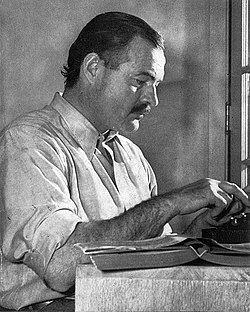Ernest Hemingway Quote
Now standing in one corner of a boxing ring with a .22 caliber Colt automatic pistol, shooting a bullet weighing only 40 grains and with a striking energy of 51 foot pounds at 25 feet from the muzzle, I will guarantee to kill either Gene Tunney or Joe Louis before they get to me from the opposite corner. This is the smallest caliber pistol cartridge made; but it is also one of the most accurate and easy to hit with, since the pistol has no recoil. I have killed many horses with it, cripples and bear baits, with a single shot, and what will kill a horse will kill a man. I have hit six dueling silhouettes in the head with it at regulation distance in five seconds. It was this type of pistol that Millen boys’ colleague, Abe Faber, did all his killings with. Yet this same pistol bullet fired at point blank range will not dent a grizzly’s skull, and to shoot a grizzly with a .22 caliber pistol would simply be one way of committing suicide
Now standing in one corner of a boxing ring with a .22 caliber Colt automatic pistol, shooting a bullet weighing only 40 grains and with a striking energy of 51 foot pounds at 25 feet from the muzzle, I will guarantee to kill either Gene Tunney or Joe Louis before they get to me from the opposite corner. This is the smallest caliber pistol cartridge made; but it is also one of the most accurate and easy to hit with, since the pistol has no recoil. I have killed many horses with it, cripples and bear baits, with a single shot, and what will kill a horse will kill a man. I have hit six dueling silhouettes in the head with it at regulation distance in five seconds. It was this type of pistol that Millen boys’ colleague, Abe Faber, did all his killings with. Yet this same pistol bullet fired at point blank range will not dent a grizzly’s skull, and to shoot a grizzly with a .22 caliber pistol would simply be one way of committing suicide
Related Quotes
About Ernest Hemingway
Hemingway was raised in Oak Park, Illinois, a suburb of Chicago. After high school, he spent six months as a reporter for The Kansas City Star before enlisting in the Red Cross. He served as an ambulance driver on the Italian Front in World War I and was seriously wounded by shrapnel in 1918. In 1921, Hemingway moved to Paris, where he worked as a foreign correspondent for the Toronto Star and was influenced by the modernist writers and artists of the "Lost Generation" expatriate community. His debut novel, The Sun Also Rises, was published in 1926. In 1928, Hemingway returned to the U.S., where he settled in Key West, Florida. His experiences during the war supplied material for his 1929 novel A Farewell to Arms.
In 1937, Hemingway went to Spain to cover the Spanish Civil War, which formed the basis for his 1940 novel For Whom the Bell Tolls, written in Havana, Cuba. During World War II, Hemingway was present with Allied troops as a journalist at the Normandy landings and the liberation of Paris. In 1952, his novel The Old Man and the Sea was published to considerable acclaim, and won the Pulitzer Prize for Fiction. On a 1954 trip to Africa, Hemingway was seriously injured in two successive plane crashes, leaving him in pain and ill health for much of the rest of his life. He committed suicide at his house in Ketchum, Idaho, in 1961.
